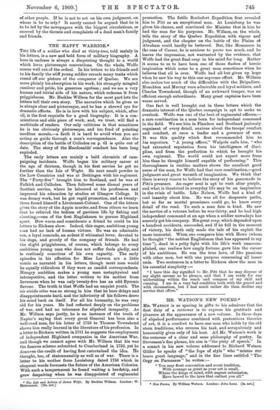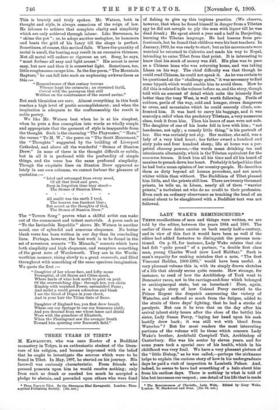MR. WATSON'S NEW POEMS.* MR. WATSON is so sparing in
gifts to his admirers that the first duty of a reviewer is to express his gratitude and pleasure at the appearance of a new volume. In these days of slipshod performance combined with pretentious theories of art, it is a comfort to have one man who holds by the old stern traditions, who reveres his task, and scrupulously and honourably gives only of his best. All Mr. Watson's work is the outcome of a clear and sane philosophy of poetry. In Stevenson's fine phrase, his aim is "the piety of speech." In a sonnet in his new volume addressed to Richard Watson Gilder he speaks of "the fops of style" who "misuse our brave great language," and in the fine lines entitled "Thu Orgy on Parnassus" he writes :— "You may flout convention and scout tradition, With courage as great as your art is small,
Where the kings of mind, with august submission, Have bowed to the laws that outlast you all."
• Nee Poems, By William Watson. London: John Lane. [Se. net.]
This is bravely and truly spoken. Mr. Watson, both in thought and style, is always conscious of the reign of law. He labours to achieve that complete clarity and simplicity which are only achieved through labour. Like Stevenson, he "skims the pot"; or, to adopt another metaphor, he hammers and beats the gold of his fancy till the shape is perfect. Sometimes, of course, this method fails. Where the quantity of metal is small, the beating may result in an excessive thinness.
Not all metal will endure so rigorous an art. Song, he says, "must forbear all easy and light accost." His accost is never easy, but now and then it is somewhat light. Sometimes, too, little roughnesses escape him. In the fine poem," The Mountain Rapture," he can fall into such an nnpleasing awkwardness as this :— "Remembrance of that ecstasy terrene Whence leapt the cataracts ; an eternised thrill, Coeval with the paroxysm that still Writhes on the countenance of the seared ravine."
But such blemishes are rare. Almost everything in this book reaches a high level of poetic accomplishment ; and when the inspiration is adequate to the craftsmanship the result is noble poetry.
We like Mr. Watson best when he is at his simplest, when he puts a fine conception into words so wholly simple and appropriate that the garment of style is inseparable from the thought. Such is the charming "The Playmates," "Hate," the verses "To M. W.," the poem on "The Scott Monument," the " Thoughts " suggested by the building of Liverpool Cathedral, and above all the wonderful "Stones of Stanton Drew." In none of these is the thought difficult or subtle, but in all it is profound with the profundity of simple
things, and the verse has the same profound simplicity. Though the exquisite lines on Stanton Drew appeared so
lately in our own columns, we cannot forbear the pleasure of quotation :— "Isled and estranged from every mood, Of all that lived and grew, Deep in forgotten time they stood— The Stones of Stanton Drew.
All sunlit was the earth I trod, The heaven was frankest blue ; But secret as the thoughts of God, The Stones of Stanton Drew."
The "Tavern Song" proves what a skilful artist can make out of the commonest and tritest materials. A poem such as "To the Invincible Republic" shows Mr. Watson in another mood, one of splendid and sonorous eloquence. No better blank verse has been written in our day than its concluding lines. Perhaps, however, the best work is to be found in the set of seventeen sonnets "To Miranda," sonnets which have both simplicity and high eloquence, and recapture something of the great note of Wordsworth. They are in the Words- worthian manner, rising slowly to a great crescendo, and filled throughout with something of the same spacious imagination.
We quote the first :—
"Daughter of her whose face, and lofty name Prenuptial, of old States and Cities speak, Where lands of wine look north to peak on peak Of the overwatching Alps : through her, you claim Kinship with vanished Power, unvanished Fame ; And midst a world grown colourless and bleak I see the blood of Doges in your cheek,
And in your hair the Titian tints of flame.
Daughter of England too, you first drew breath Where our coy Springs to our coy Summers yield ; And you descend from one whose lance and shield Were with the grandsire of Elizabeth,
When the Plantagenet saw the avenger Death Toward him spurring over Bosworth field."































































 Previous page
Previous page